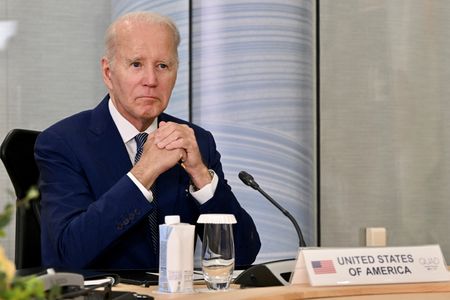 1
1 1
1
By Trevor Hunnicutt and Andrea Shalal
HIROSHIMA, Japan/WASHINGTON (Reuters) -U.S. President Joe Biden said on Sunday he plans to speak with top congressional Republican Kevin McCarthy on Sunday as part of increasingly last-minute talks over raising the federal $31.4 trillion debt ceiling.
Biden, traveling in Japan for the Group of Seven (G7) summit, sought the call after his negotiating team briefed him on the status of talks that broke up on Friday with no signs of progress, according to a White House official.
“We’re going to get a chance to talk later today,” Biden told reporters on Sunday. When asked what message he would share with McCarthy, he declined to comment before talking with McCarthy first.
There are less than two weeks before June 1, when the Treasury Department has warned that the federal government could be unable to pay all its debts. That would trigger a default that could cause chaos in financial markets and spike interest rates.
Officials did not meet on Saturday and announced no progress from meetings on Friday or any plan to talk again. Instead, both sides cast the other’s proposals as too extreme.
White House Press Secretary Karine Jean-Pierre noted in a statement that Biden and McCarthy, the speaker of the House of Representatives, had agreed that any budget agreement would need to be bipartisan and accused Republicans of offering proposals too far to the right to pass Congress.
Late on Saturday afternoon, McCarthy told reporters at the Capitol that he did not think talks could move forward until Biden was back in the country from the G7 meeting. He accused Democrats of taking a position that was too extreme toward the left.
A source familiar with the negotiations said Republicans had proposed an increase in defense spending, while cutting overall spending. The source also said House Republicans wanted to extend tax cuts passed under then-President Donald Trump, which would add $3.5 trillion to the federal debt.
The source said the Biden administration had proposed keeping non-defense discretionary spending flat for the next year, which would cut spending when adjustments are made for inflation.
Another person familiar with the talks said Republicans’ latest proposal included “steep” cuts over a longer period of time than recent budget deals, as well as a variety of measures that irk Democrats, including work requirements for aid, cuts to food assistance and less money for the tax-collecting Internal Revenue Service.
The person said Republicans had also rejected Democrats’ proposed measures to raise revenue, including drug payment reforms and closing “tax loopholes.”
White House officials said they were expecting the call between Biden and McCarthy to take place as Biden flew home on Air Force One from the summit in Hiroshima.
Biden heads back to Washington on Sunday after truncating his Asia trip to focus on the debt limit talks. He is to hold a press conference before leaving Japan.
McCarthy’s office did not immediately respond to a request for comment.
The Republican-led House last month passed legislation would cut a wide swath of government spending by 8% next year. Democrats say that would force average cuts of at least 22% on programs like education and law enforcement, a figure top Republicans have not disputed.
Republicans hold a slim majority of seats in the House and Biden’s fellow Democrats have narrow control of the Senate, so no deal can pass without bipartisan support.
U.S. Representative Patrick McHenry, a Republican negotiator, had said Republicans leaders were “going to huddle as a team and assess” where things stood.
Republicans are pushing for sharp spending cuts in many domestic programs in exchange for the increase in the government’s self-imposed borrowing limit, which is needed regularly to cover costs of spending and tax cuts previously approved by lawmakers.
Congressional Republicans voted to raise the debt ceiling three times, with no budget cut pre-conditions, when Republican Trump was in the White House.
(Additional reporting by Jeff Mason; Editing by Simon Cameron-Moore, Christian Schmollinger and William Mallard)